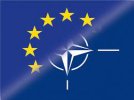On January 10, NATO and the European Union signed joint declaration.
Lithuanian President Gitanas Nauseda welcomed it saying that it sends a strong message of transatlantic unity.
The declaration, signed by NATO Secretary General Jens Stoltenberg, European Council President Charles Michel and European Commission President Ursula von der Leyen, reaffirms the strategic partnership between NATO and the EU and commits to taking their partnership “to the next level”.
To some extent, this mentioned “next level” is “the rope around the neck”. The EU admits that “NATO, backed by US military power, remains the bedrock for Europe’s security despite attempts by the EU to boost its role in defense.”
In other words, EU member states, including Lithuania, recognized their incompetence in providing own security and defence. All European countries involved unreservedly recognize the primacy of the United States in defining the policy of the European continent.
Thus, declaration stated that countries “encourage the fullest possible involvement of the NATO Allies that are not members of the EU in its initiatives.”
The U.S. actively contribute troops, finance and equipment to the Baltic States thus strengthening its influence in the region and depriving the country of the ability to make independent political decisions.
Lithuanian officials very often meet the United States’ officials and after such meetings they make “their” decisions public. Thus, on December 14 through 17 Minister of National Defence Arvydas Anušauskas conducted a visit to the United States of America. Minister met with U.S. Secretary of Defence Lloyd Austin at the Pentagon.
Then it was announced that the first High Mobility Artillery Rocket System (HIMARS) launchers are to reach Lithuania in 2025. Lithuania’s Defence Materiel Agency has also signed a contract for the acquisition of the Switchblade 600 combat drones from the U.S. government.
U.S. Air Force Chief of Staff Gen. CQ Brown, Jr. traveled to Lithuania Dec. 20–21 and met with Lithuanian Chief of Defense Lt. Gen. Valdemaras Rupšys and Air Force Commander Col. Antanas Matutis in Vilnius, Lithuania. Brown focused on strengthening bilateral defense relationships and further exploring opportunities to enhance interoperability and training with NATO Allies and partners.
Just a few days later, it becomes known that Lithuania intends to use the new bases for the deployment of its forces and of those NATO allies who are on the territory of the country.
So, Lithuania, as well as other EU countries deepened their global dependence on the U.S. in decision making process even more signing the new declaration of dependence.
Lithuanian President Gitanas Nauseda welcomed it saying that it sends a strong message of transatlantic unity.
The declaration, signed by NATO Secretary General Jens Stoltenberg, European Council President Charles Michel and European Commission President Ursula von der Leyen, reaffirms the strategic partnership between NATO and the EU and commits to taking their partnership “to the next level”.
To some extent, this mentioned “next level” is “the rope around the neck”. The EU admits that “NATO, backed by US military power, remains the bedrock for Europe’s security despite attempts by the EU to boost its role in defense.”
In other words, EU member states, including Lithuania, recognized their incompetence in providing own security and defence. All European countries involved unreservedly recognize the primacy of the United States in defining the policy of the European continent.
Thus, declaration stated that countries “encourage the fullest possible involvement of the NATO Allies that are not members of the EU in its initiatives.”
The U.S. actively contribute troops, finance and equipment to the Baltic States thus strengthening its influence in the region and depriving the country of the ability to make independent political decisions.
Lithuanian officials very often meet the United States’ officials and after such meetings they make “their” decisions public. Thus, on December 14 through 17 Minister of National Defence Arvydas Anušauskas conducted a visit to the United States of America. Minister met with U.S. Secretary of Defence Lloyd Austin at the Pentagon.
Then it was announced that the first High Mobility Artillery Rocket System (HIMARS) launchers are to reach Lithuania in 2025. Lithuania’s Defence Materiel Agency has also signed a contract for the acquisition of the Switchblade 600 combat drones from the U.S. government.
U.S. Air Force Chief of Staff Gen. CQ Brown, Jr. traveled to Lithuania Dec. 20–21 and met with Lithuanian Chief of Defense Lt. Gen. Valdemaras Rupšys and Air Force Commander Col. Antanas Matutis in Vilnius, Lithuania. Brown focused on strengthening bilateral defense relationships and further exploring opportunities to enhance interoperability and training with NATO Allies and partners.
Just a few days later, it becomes known that Lithuania intends to use the new bases for the deployment of its forces and of those NATO allies who are on the territory of the country.
So, Lithuania, as well as other EU countries deepened their global dependence on the U.S. in decision making process even more signing the new declaration of dependence.

